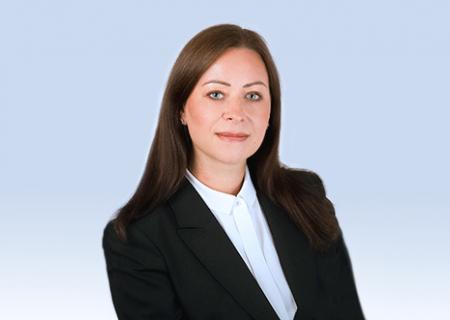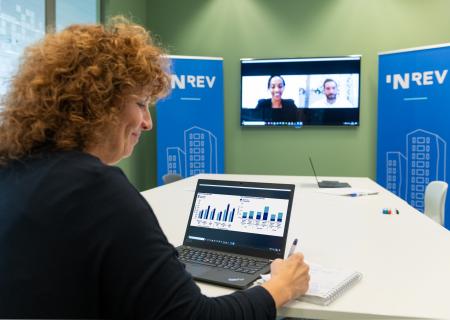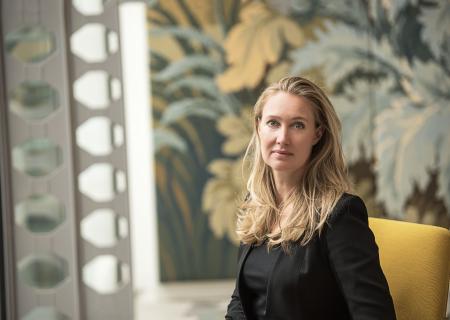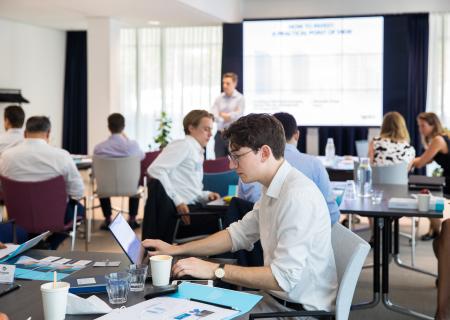Insights on the INREV Performance Measurement Committee
Peak performance
The Performance Measurement Committee (PMC) has had a busy few years working with INREV on the development of several new indices, most notable being the INREV Asset Level Index and the European ODCE Fund Index.
IQ caught up with the committee’s current chair David Hedalen, Head of UK and European Real Estate Strategy, Aberdeen Standard Investments, and its newest member Zara Walsh, Senior Fund Manager, IPUT, to find out what’s been keeping the PMC busy and what’s in store for the future.
David, what is the committee for and how does it work?
DH: At its core, the PMC looks to increase the quality, accuracy and completeness of INREV market information, and crucially, it aims to develop new indices and index tools to enhance the transparency of non-listed real estate. But it’s not just about development, it’s also about governance, defining standards and promoting best practices for performance measurement of non-listed real estate vehicles.
We meet monthly to discuss projects currently under development and ideas for new ones. Three of the most important recent projects have been the Asset Level Index (ALI), the INREV European ODCE Index and the Global IRR Index, and we’re now also beginning to look at how a debt fund index could be put together.
The committee is comprised of ten members from different backgrounds – something we encourage to ensure broad-based expertise and different perspectives. Their day-jobs cover fund management, research, strategy and business development functions, as well as performance measurement and analytics.
The committee is comprised of ten members from different backgrounds – something we encourage to ensure broad-based expertise and different perspectives
Zara, what attracted you to join the committee?
ZW: IPUT has always been a big supporter of transparency in the real estate market, so INREV, and its sophisticated work in performance measurement, has become really important for us. As a fund manager, I’m keen to contribute my experience to the way that INREV’s indices are developing at the asset level. I’ve been very impressed by how well it’s run and the way that it seeks to reflect a wide range of views from across the industry.
So it’s all about the INREV indices?
DH: We do have a strong focus on indices, and governance around them. For example, the Historical Data project was a major initiative a couple of years ago, encouraging members to provide and verify historic data on their funds. This was very important for taking the history of the INREV Quarterly Index back to 2000 and for the development of some of the newer indices like the IRR Index, which can now compare performance of different fund vintages going back to the 2000s.
Where do the ideas for new indices come from?
ZW: Ideas predominately come from the membership. Ultimately, the aim is to provide indices and analytical tools that the members need, so an important part of our role is to understand what’s important for members and the European non-listed real estate industry. Another way is by collaborating with other INREV committees. For instance, we are keen to link up with the ESG Committee to discuss the relationship of financial performance to ESG factors, particularly at the asset level – but again this comes from the membership’s needs.
We are keen to link up with the ESG Committee to discuss the relationship of financial performance to ESG factors, particularly at the asset level – but again this comes from the membership’s needs.
Has the COVID-19 crisis had an impact on the committee’s work?
DH: The pandemic has led to a surge of requests from INREV members with a particular interest in the impact on fund investment performance, especially in terms of valuations under material uncertainty clauses and rent payment.
To address this, we initiated a subgroup to develop a survey to gauge market activity in this area. In a very short timeframe, the survey on the Impact of COVID-19 on Valuations was up and running with about 80 funds contributing for Q1 2020 and some 175 funds for Q2 2020.
The committee seems to have a busy schedule. How does it cope?
ZW: One way is by creating dedicated focus groups to specific areas, not only for indices like ALI but also for more niche ones such as the Global Investor Index, for example. I’ve been very impressed by the commitment of the members in supporting the group activities, getting involved with the nuts and bolts of index methodology and output specification. This is not always just committee members but with support from others drafted in from the PMC alumni and the wider INREV membership.
Can you tell us how the PMC is contributing to INREV’s increasingly global approach?
DH: We have been collaborating more and more with our regional partners ANREV and NCREIF to produce global indices that allow for inter-regional comparisons, for instance the Global IRR Index and the Global Real Estate Fund Index (GREFI). Such collaboration can also help in other ways – for example, NCREIF worked alongside us to help us develop the ALI, an area where they have a great deal of experience and expertise. The Asset Level index is continuing to grow rapidly, with two new contributors joining this year raising its total value to more than €185 bn in Q2 2020.
We have been collaborating more and more with our regional partners ANREV and NCREIF to produce global indices that allow for inter-regional comparisons, for instance the Global IRR Index and the Global Real Estate Fund Index (GREFI).
Next on the agenda is to explore the potential for a Global ODCE Index, following similar principles to the GREFI and Global IRR Index.
What do you expect the committee to be working on in the future?
ZW: A debt funds index is in the pipeline, and is especially pertinent since this area of the market has become increasingly important in light of the global pandemic, and we are keen to develop an ESG-related performance indicator as the focus on measuring ESG performance intensifies.
DH: We’re also seeing a growing appetite for data as our family of indices expands. As INREV brings greater transparency to the markets, then users of that information inevitably have more questions about what’s driving trends. Members are becoming increasingly aware of this capability, which is encouraging. So we are also working on the development of the analytical tools, increasing usability and helping members harness the data for deeper analysis and reporting.
We’re also seeing a growing appetite for data as our family of indices expands
We are also starting to look into further transparency with fund to asset level attribution analysis using the European ODCE funds and ALI.
David, as a long-standing member and chair of the committee, has its work met your expectations?
DH: Definitely – in fact it has probably exceeded them. I joined three years ago, based on my interest in both the fund management and analytical aspects of performance measurement in my role at Aberdeen Standard Investments. I believe the committee has achieved a lot in these areas over three years I’ve been a member and it has really been a privilege to chair such an active group.












